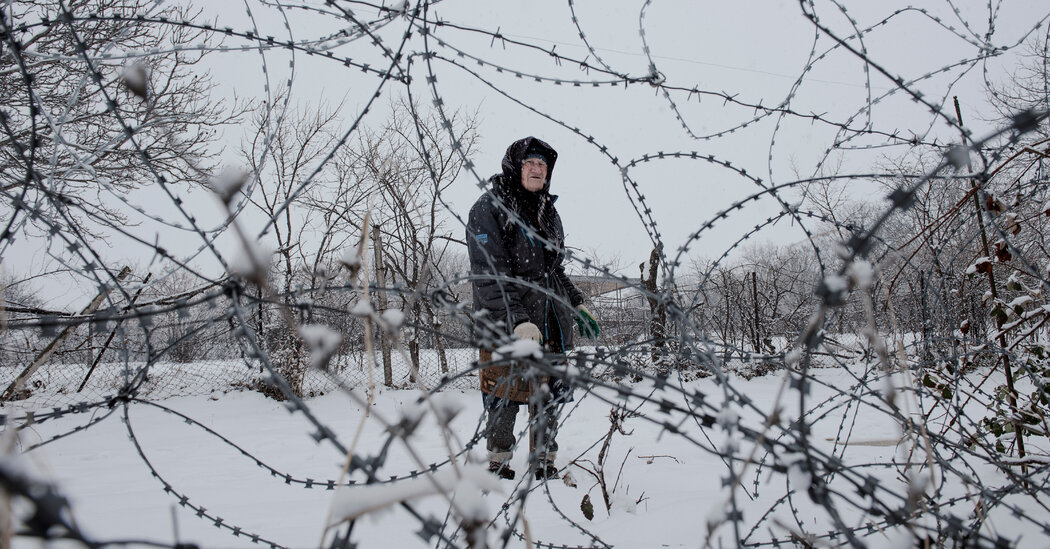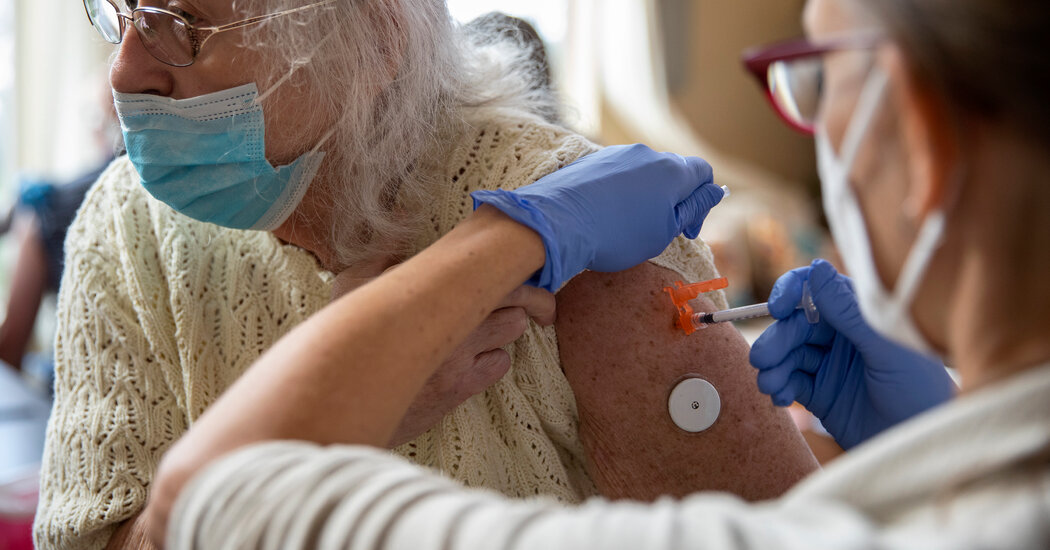
Russia invaded Georgia in 2008. To many Georgians, that means the country should stand unequivocally with Ukraine. But the government is more cautious.
KHURVALETI, Georgia — When she hears the latest news from Ukraine, Tina Marghishvili, a Georgian farmer, remembers the forest her father planted. She remembers her childhood home, her cows, her family orchard — all the land and belongings that her family hasn’t seen since 2008, when Russian troops forced them from their hometown during that year’s Russian-Georgian war.
“I watch the Ukraine news, I remember 2008, and it makes me cry,” said Ms. Marghishvili, 57, who now lives in a camp for Georgians displaced by that 2008 war. “Georgia should be sanctioning Russia, blockading them, boycotting their exports.”
And for Ms. Marghishvili, the big mystery is: Why hasn’t the Georgian government already done that?
Along Russia’s borders, in post-Soviet countries like Georgia that remain caught between Russian and Western influence, the Russian invasion of Ukraine has presented governments with a strategic dilemma.
Apart from Belarus, none have backed the Russian offensive. But nor have they strongly opposed it — fearful of upsetting a dominant neighbor that is a major source of trade and remittances, a guarantor of some countries’ security and a potential aggressor to others.
A small, mountainous country of 3.7 million people at the southeastern extreme of the European continent, Georgia is perhaps running the narrowest gauntlet. Russia invaded parts of Georgia 14 years ago, and Russian troops still protect South Ossetia and Abkhazia, two secessionist statelets that broke away from Georgia during the 1990s and then expanded in 2008. That has put Russia in de facto control of roughly a fifth of Georgian territory, including the town in South Ossetia where Ms. Marghishvili once lived.
To the Georgian government, this precarious dynamic makes it unwise to speak out too strongly against Russia, lest Russia turn on Georgia next.
“We live next to a volcano,” said Giorgi Khelashvili, a lawmaker for Georgia’s ruling party, Georgian Dream. “The volcano just erupted, and it just happens that the lava is currently flowing down the other side of the mountain.”
But this cautious approach has put the Georgian government at odds with most of its population — creating a far more pointed clash between majority opinion on Ukraine and government policy than in most other European countries.
Recent polling suggests nearly 60 percent of Georgians want a stronger stance on Ukraine from their elected officials, and many have hung Ukrainian flags from their apartments and offices in Tbilisi, the Georgian capital. Tens of thousands of Georgians have rallied to support Ukraine, and to criticize the government’s equivocal approach to a brotherly nation.
“We have different lands and different countries, but we have the same sky and we have the same enemy,” said Dato Turashvili, a popular Georgian novelist, and one of many Georgians flying a Ukrainian flag outside his home.
“The Georgian government says, ‘It’s better to be careful, Russia is dangerous’ — but that doesn’t matter to the Kremlin,” said Mr. Turashvili. “If they take Kyiv, they will take Tbilisi.”
The government says the criticism is unfair, since it has taken some measures that could anger Russia.
Days after the invasion began, Georgia submitted a rushed application for membership in the European Union — a largely symbolic indication of its pro-Western orientation, since full membership is years away. The government sent humanitarian aid to Ukraine, admitted more than 5,000 Ukrainian refugees and voted in favor of a United Nations resolution condemning the invasion of Ukraine.
Georgia has also admitted more than 30,000 Russians since the war started, of whom 12,000 have remained there, with Tbilisi joining Istanbul as one of the primary destinations for the new wave of young Russian exiles.
But despite rising anger from Georgian society, the Georgian government has generally avoided condemning Russia directly, and has refused to impose sanctions on the Russian economy. The government has clashed with the country’s ceremonial president, who has taken a stronger position; prevented a charter plane of Georgian volunteers from flying to Ukraine; and blocked entry to several Russian dissidents.
The Georgian prime minister, Irakli Garibashvili, also dismissed the effectiveness of sanctions, suggesting that no external actor could save Ukraine — a comment that many Georgians found needlessly defeatist. Tellingly, Russia did not include Georgia on a recent list of countries it had deemed unfriendly, while Ukraine has withdrawn its ambassador to Georgia.
All this has led to allegations that Georgian Dream has been co-opted by Moscow — unproven claims that have nevertheless gained momentum because the party’s founder and former leader, the billionaire Bidzina Ivanishvili, made much of his fortune in Russia. Mr. Ivanishvili’s representatives ignored several interview requests. But he no longer has a formal role in the party, and the party denies claims of Russian interference.
“If that had been the case,” said Mr. Khelashvili, the Georgian Dream lawmaker, “then Georgia’s permanent insistence on integrating with the West, and most importantly our latest declaration about joining the European Union, would have seemed quite out of logic.”
But to many Georgians, the party’s attitude to Russia still strays from pragmatism into needless deference, said Olesya Vartanyan, a Tbilisi-based analyst for the International Crisis Group, a global affairs research institute.
For years, Ms. Vartanyan had tried to avoid describing Georgian Dream as pro-Russian, choosing instead to argue that the party’s interests merely aligned with Russia’s. Now, for the first time, she said, “I say this is not the Georgian Dream, this is the Russian Dream.”
One cause of the government’s caution can be found a few hundred yards from the home of Ms. Marghishvili, the displaced farmer. She now lives close to the boundary of South Ossetia, one of the two breakaway territories guarded by Russian troops. The southern tip of South Ossetia runs just 500 yards north of Georgia’s main east-west highway, meaning that Russian troops stationed there could cut Georgia in half within minutes.
Up a potholed road lies Khurvaleti, one of hundreds of Georgian villages bisected by the boundary line. In the years since 2008, Russian troops have increasingly fortified this boundary with fences and ditches — cutting off many Georgians from their homes, and often arresting those who still try to cross it.
Since the start of the Russian invasion of Ukraine, Georgian intelligence officers have detected no indications of renewed Russian aggression against Georgia, said Giorgi Sabedashvili, head of analysis at the Georgian state security service.
Russia-Ukraine War: Key Things to Know
A Ukrainian base is hit. A missile attack on a barracks in the southern city of Mykolaiv killed as many as 40, a Ukrainian official said. That number would make it one of the single deadliest attacks on Ukrainian forces since the start of the war, and the death toll could be much higher.
But in villages like Khurvaleti, where the situation is always tense, this is little comfort.
Since the Russian invasion of Ukraine began, “people are more afraid here,” said Valya Vanishvili, 85, a Khurvaleti resident whose home has been separated from the rest of the village by a Russian fence.
“The Russians are doing to Ukraine what they did to us,” said Ms. Vanishvili, standing on one side of the fence as two Times journalists stood on the other. “Maybe something will happen again here,” she added.
To some Georgians, these fears justify the government’s ambiguous position on Ukraine.
Supporters of the government stance include the Georgian Orthodox Church, one of the country’s most powerful civil institutions, whose priests have historically criticized the liberal values they associate with the West.
“We remember that Russian troops are standing just 50 kilometers away,” said the Rev. Andrea Jaghmaidze, a spokesman for the church, referring to the boundary between Georgia and South Ossetia, about 30 miles distant. “Therefore great wisdom should be shown,” he added, “so as not to place extra burden on the country.”
But many Georgians feel that it would be not only more dignified to take a more vocal stance, but also more strategic.
By taking an ambiguous stance on Ukraine, Georgia risks signaling to the West that it is uninterested in proper ties with Europe and North America, and therefore not worth the West’s support, said Giorgi Gakharia, a former prime minister.
“If your standing is not clear, and if your standing is not values-based,” then “the Brits, the Germans, the French, the Americans will have questions,” Mr. Gakharia said. “Where does Georgia stand?”
In some cases, the desire for a stronger stance against the Russian state has morphed into anger at the new Russian émigrés, who have found themselves in an intimidating environment.
“Citizens of the Russian Federation,” reads a flyer recently posted across central Tbilisi. “You are not welcome here.”
Some Georgian landlords have refused to rent apartments to Russian tenants. Alexey Voloshinov, a 20-year-old journalist for Rosbalt, a Russian news organization listed by the Kremlin as a foreign agent, said a landlord had refused him tenancy last week “because we’re Russians, and the Russian soldiers killed her son in the Russian-Georgian war in 2008,” Mr. Voloshinov said.
Mr. Turashvili, the novelist, empathizes with dissidents and journalists like Mr. Voloshinov. His most famous novel, “Flight From The U.S.S.R.,” is about a group of Georgian dissidents who tried to escape the Soviet Union in the 1980s.
But in a sign of the times, even Mr. Turashvili is wary of admitting too large a wave of Russians. Like many Georgians, he worries that a majority have fled for financial reasons rather than any sincere opposition to the Kremlin.
“They have the best writers in Russia,” Mr. Turashvili said. “But maybe no good readers.”
Mariam Zibzibadze contributed reporting.




